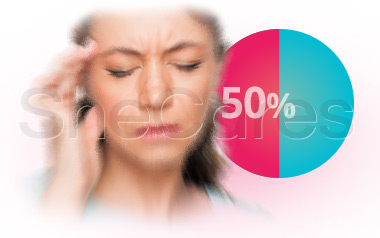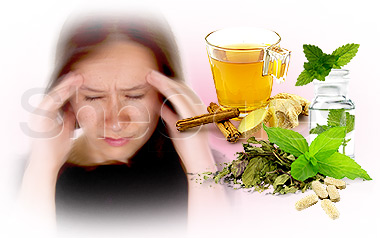About
Feelings of weakness, nausea, confusion and loss of balance often accompany dizziness. People who experience frequent spells of dizziness may struggle to deal with this persistent interruption. Though generally not life-threatening, dizziness can be the symptom of another medical condition.
It's important to listen to the body and slow down when experiencing dizziness, because this condition can lead to falls or fainting. Symptoms vary from person to person, ranging from occasional, mild dizzy spells to severe frequent episodes. Dizziness is common during certain reproductive stages in a woman's life, such as during puberty, pregnancy, postpartum - including breastfeeding - and menopause.
Dizzy spells also affect people differently, and some will be able to recover quickly, while others will take longer to recover, or in extreme cases, find it impossible to carry on with their daily activities.
Identifying Dizziness
Dizziness is a subjective term in the medical field, as it can mean different things to different people, and is difficult to measure. In general terms, dizziness could be related to vertigo, disequilibrium, and presyncope.
Keep reading to learn more about the causes of dizziness.
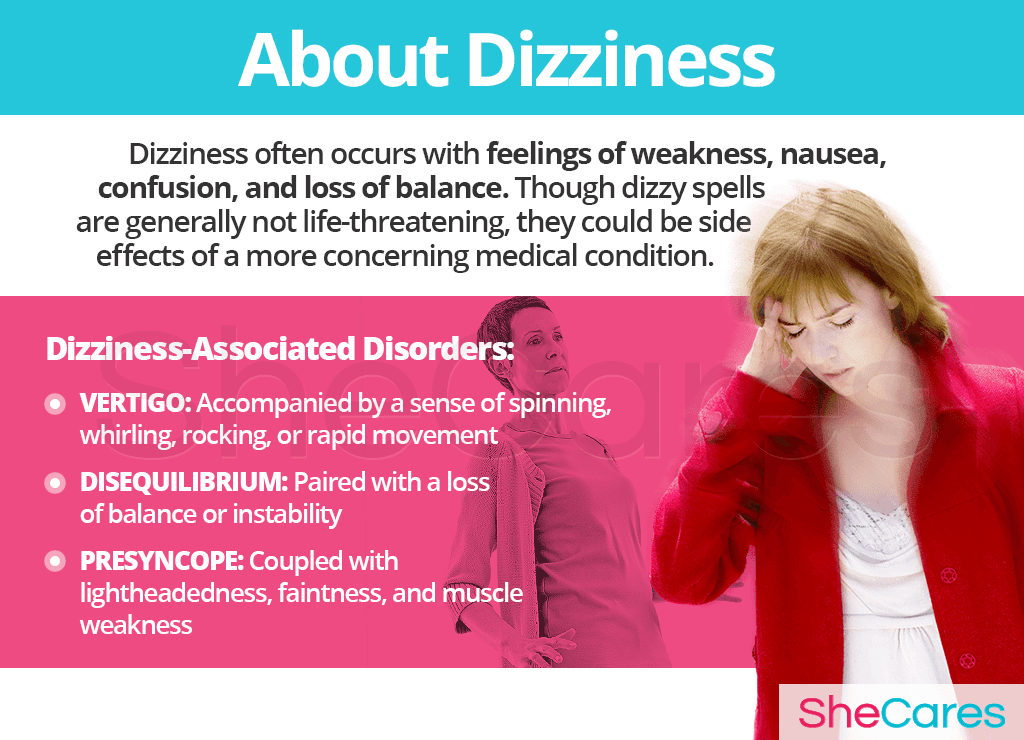
Causes
Dizziness is generally the symptom of hormonal imbalance, which is commonly experienced in women during the stages of puberty, pregnancy, postpartum, and menopause. Though hormonal imbalance is the main cause of dizziness, other issues, like motion sickness, or low blood sugar can also be causes.
Other typical causes of dizziness include:
- Anemia
- Internal bleeding
- Illness (e.g. cold or flu)
- Medications
- Anxiety / panic disorder
As noted, dizziness can sometimes be caused by hormonal changes. Read on to discover the hormonal cause of dizziness.
Hormonal Causes of Dizziness
Hormones are chemical messengers responsible for the regulation of bodily fluids including growth, brain function and sexual reproduction. Accordingly, a shift in normal levels of hormones - specifically estrogen and progesterone - can cause unexpected side effects.
It is believed that low estrogen levels provoke blood flow fluctuations throughout the body, thus causing feelings of lightheadedness and dizziness. Hormonal imbalance can also cause irregularities in blood sugar metabolism and problems with inner ear, both of which may lead to dizziness. It can occur alongside other low estrogen symptoms, such as hot flashes. While episodes of dizziness have been linked to high levels of anxiety, hormonal fluctuations through life - especially during menopause - are thought to increase the chances of developing dizziness-related disorders, such as benign paroxysmal positional vertigo (BPPV).
There are also specific hormonal causes that vary with every stage of a woman's reproductive life in which this disorder appears. These hormonal causes and other factors can influence a woman's experience of dizziness, as is evident during puberty, pregnancy, post-partum, and menopause.Hormonal Causes during Different Phases in a Woman's Life
Puberty is the stage when a girl's body starts producing reproductive hormones; these and other factors, such as poor diet and alcohol consumption, may cause dizziness at this time.
Pregnancy leads to extreme changes in the production of reproductive hormones, which along with other factors, like fatigue or bodily changes, can lead to dizziness.
Postpartum and breastfeeding is another stage when reproductive hormones are imbalanced, leading to symptoms like dizziness. Also, other factors contribute to dizziness during postpartum, like postpartum depression.
Menopause is the stage in a woman's life when production of reproductive hormones naturally declines, signaling the end of a woman's fertility. As well as hormonal causes, other factors add to the reasons for dizziness during menopause, including the experience of other symptoms of menopause.
While hormonal imbalance is the most common cause of dizziness during a woman's life, dizziness may also be caused by other more rare underlying conditions.
Other Less Common Causes of Dizziness
Other causes of dizziness that are not related to hormonal imbalance include: viral infections, Meniere's disease, low blood pressure, arthritis of the spine or neck, hyperventilation, as well as alcohol and drug abuse.
Dizziness may occur as the result of hormonal imbalance during certain times in a woman's life, but it may also indicate a more serious condition. Keep reading to discover when to seek professional help for cases of dizziness relating to heart attack, stroke, carbon monoxide poisoning and seizures.
Although dizzy spells are commonly caused by hormonal imbalance, some women are more at risk of experiencing dizziness than others. Continue reading to learn more about the risk factors associated with dizziness.
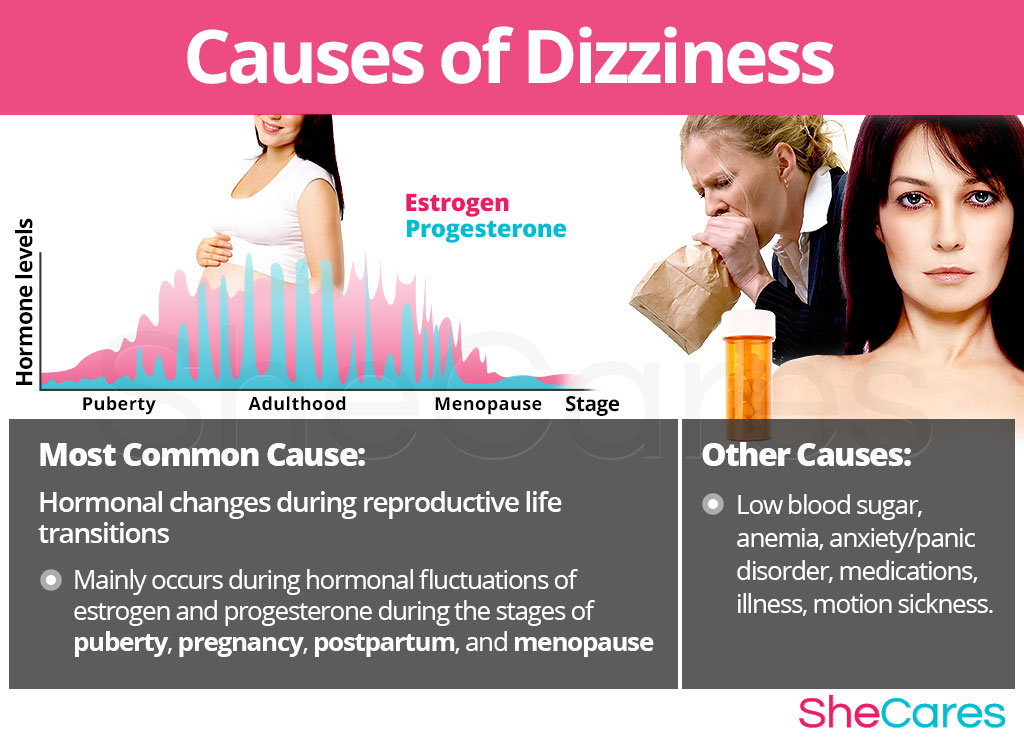
Risk Factors and Triggers
Risk Factors for Dizziness
Some women are more susceptible to suffering from dizziness than others for different psychological, behavioral and health reasons. These factors can affect a woman's hormone levels and impact her chances of experiencing dizziness during her reproductive life.
- Health risk factors. In general, women with poor overall health are more susceptible to experiencing dizziness than healthy women. Women with any of the following health conditions may have dizzy spells as a result:
- Diabetes. People with diabetes are unable to naturally produce the hormone insulin. Insulin helps to regulate glucose levels in the blood stream. Consequently, diabetics may experience dizziness when glucose levels in the body are too high or low.
- Prescription drugs or treatments, especially those used to control blood pressure, can cause dizziness. It is important for women to speak with their doctors about the potential side effects of any medication before taking it, and they should be sure to discuss any additional medications that they're taking, to ensure that one is prescribed a compatible combination.
- Other medical conditions. Extreme tiredness, chronic pain, abnormal heart rhythm, Meniere's disease and food allergies are possible causes of dizziness.
- Psychological risk factors. Further research suggests that the following psychological conditions are also potential causes of dizziness:
- Anxiety. Women suffering from anxiety often spend a disproportionate amount of time worrying, which can cause anxiety attacks. Anxiety attacks that cause hyperventilation can lead to dizzy spells.
- Stress. Women experiencing chronic stress may begin to hyperventilate also, which causes dizziness.
Triggers of Dizziness
Beyond the long-term risk factors, dizziness can also be triggered by other habits and environments. Avoiding these habits and controlling one's reactions to these environments can help to decrease dizziness symptoms.
When choosing a treatment plan for dizziness, it's important to understand the signs and symptoms. Continue reading to discover more about the signs and symptoms of dizziness in women.
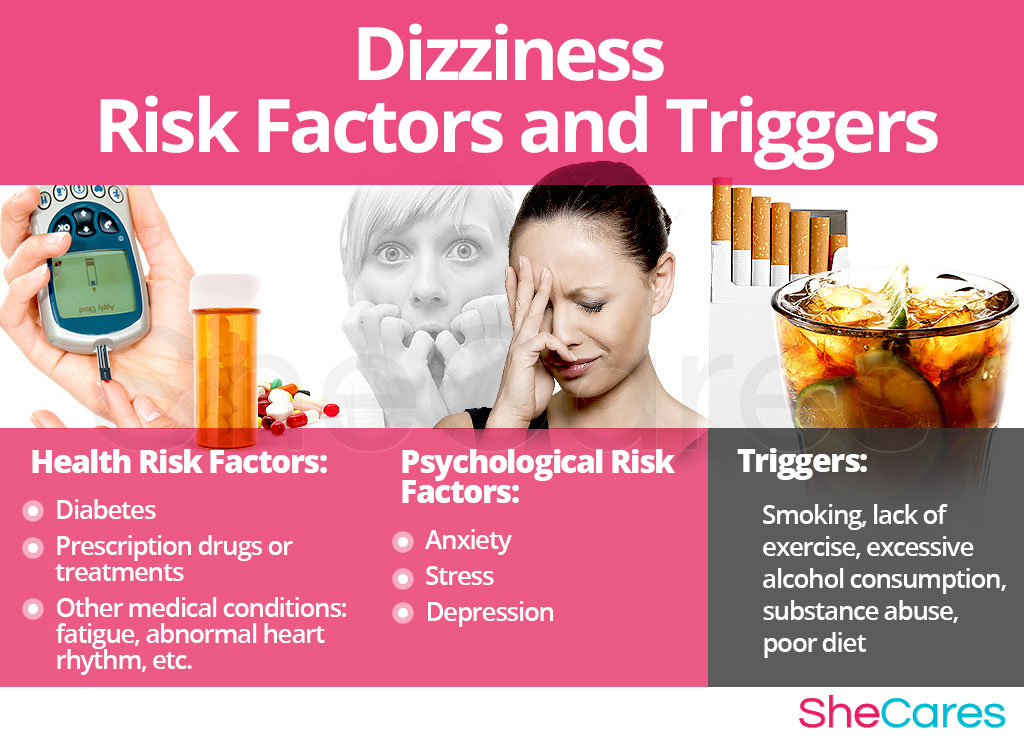
Signs and Symptoms
There are different medical signs and symptoms that can be useful in identifying dizziness. Keep reading to learn more about them, as well as what to expect during a doctor's visit.
Common Symptoms Associated With Dizziness
- Lightheadedness
- Faintness
- Loss of balance
- Feelings of unsteadiness or spinning
- Nausea
- Vomiting
- Confusion
Signs of Dizziness
In addition to the physical symptoms associated of dizziness, there are also medical indicators that are not always obvious, and can be assessed by a doctor or healthcare professional.
- Estrogen levels. Estrogen can cause hormonal imbalances, particularly during puberty, pregnancy, postpartum and menopause. The inconsistent levels of estrogen in a woman's body during these periods may result in dizzy spells.
- Time and duration of symptoms. It may be helpful to monitor and record bouts of dizziness, including when it occurs, how often it occurs, as well as food consumed and stress levels that day. This may help to establish a pattern, such as dizziness occurring when a woman has had an excessive amount of caffeine, encountered a stressful situation at work, or during menstruation. For example, certain women experience morning dizziness quite often.
If dizziness is unmanageable, or may be caused by something other than hormones, it is advised to consult a physician, who can perform tests in order to properly treat the individual case. Keep reading to learn more about dizziness diagnosis and tests.
Diagnosis of Dizziness
A doctor will perform three procedures in order to diagnose and identify dizziness. They will review the patient's medical history, and conduct a physical examination and a psychological evaluation. If necessary, additional tests will be conducted.
Following the doctor's visit, further tests may be required. Continue reading to learn more about preventing and managing dizziness.
Complications of Dizziness
Occasional bouts of dizziness are generally nothing to be concerned about, but in rare cases, it can be a sign of a serious health condition. Dizziness can cause vomiting, nausea, the inability to think clearly, and various other complications.
It may take special exercises, alternative treatment or drugs in order to get a woman's dizzy spells under control enough for her to function. Women who experience dizziness need to be especially mindful about the physical space around them because of the possibility of falls or fainting, and should not drive or operate heavy machinery if there's a possibility that a dizzy spell will occur.
Mild cases of dizziness can be part of the hormonal changes associated with a woman's menstrual cycle. However, uncontrollable dizziness can severely affect a woman's quality of life. Some complications of dizziness include specific warning signs.
Complications including unclear thinking, fatigue, loss of balance, migraines, facial numbness, eye pain, ringing in the ears and chest pain have all been linked to dizziness, which is why identifying the cause of dizziness is essential, as soon as possible. Keep reading to discover how to best prevent and manage dizziness.
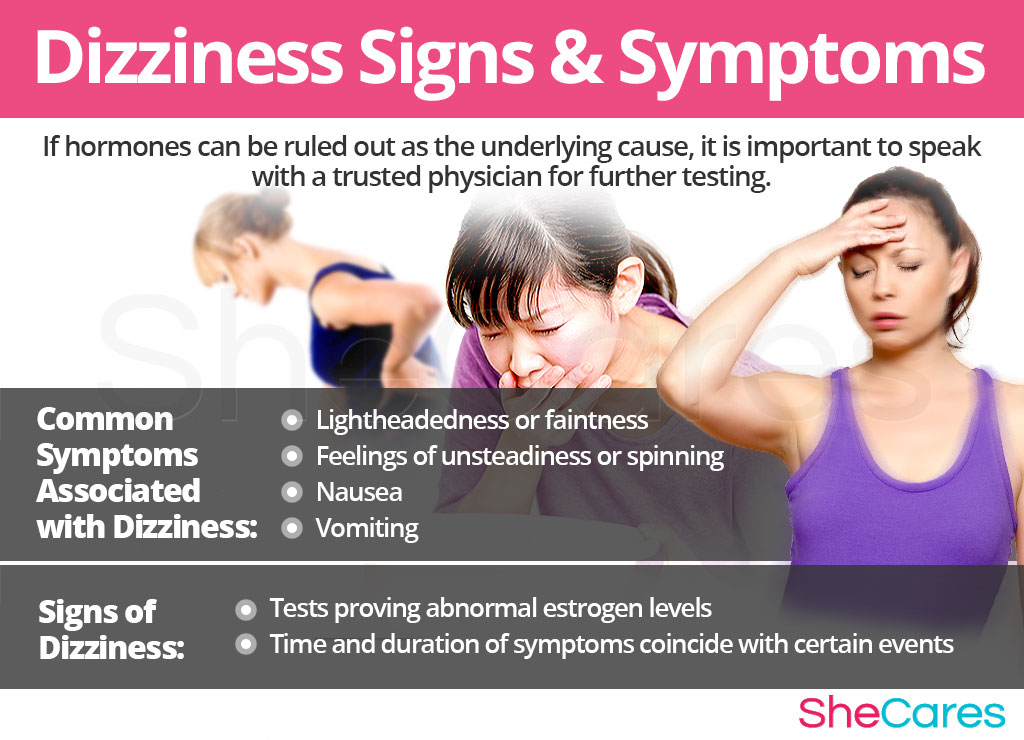
Prevention and Management
Preventing Dizziness
There are many behavioral changes someone suffering from dizzy spells can make in order to best prevent and handle dizziness. Diet, use of supplements, habits and exercise can be combined for optimum management.
For women who are already experiencing dizziness, it may not be possible to prevent dizzy spells. On the plus side, there are many different ways that women can manage dizziness, and decrease the intensity of symptoms. Continue reading to learn how to manage dizziness.
Managing Dizziness
No matter where a woman is when she is experiencing dizziness, there are effective ways that she can best manage her condition. Making changes in daily routine and avoiding triggers can greatly impact a woman's experience of dizziness.
There are many things that women can do in order to lessen the impact of dizziness on their lives, no matter where they are when a dizzy spell occurs.
It is important to identify the root cause of dizziness, in order to find the best possible treatment. Continue reading to learn more about treatments for dizziness.
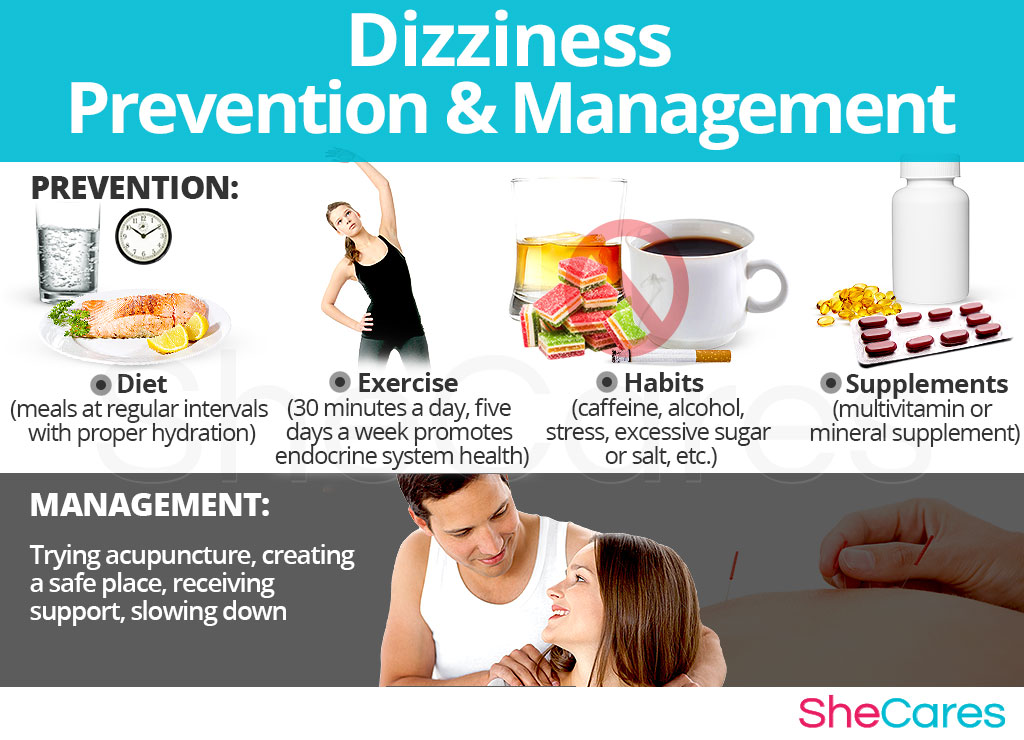
Treatments
The treatment for each individual case of dizziness depends on its cause. Although many minor cases of dizziness can recover on their own, it's important that recurring episodes of dizziness be treated, because this symptom can be the sign of a more serious medical condition.
Three Approaches to Treat Dizziness
The three categories of dizziness treatments are (1) Lifestyle Changes, (2) Alternative Medicine and (3) Pharmaceutical Options.
Women are encouraged to begin with the first line of treatments, lifestyle changes, which involve the least risks. Lifestyle changes can make a big difference in alleviating dizziness; however, they do not address the root cause of dizziness, which is hormonal imbalance. Fortunately, when coupled with alternative medicine, lifestyle changes can be an effective method of treating dizziness.
Lifestyle Changes for Dizziness
Making lifestyle changes tends to be the least expensive and invasive form of treatment, but often involves the most self-discipline. Implementing a healthy diet, regular exercise and healthy habits can all make a difference in helping to alleviate dizziness.
It may be helpful to keep a diary in order to track dizzy spells to check for trends. Include details such as the time that dizzy spells occur, how long they last, the activity preceding dizziness and any other relevant details.
If lifestyle changes do not decrease the occurrence of, severity or intensity of dizziness, it may be helpful to incorporate alternative treatments into one's daily routine.
Alternative Medicine for Dizziness
Alternative medicines involve minimal risk, and can treat dizziness at the root of the problem, which is hormonal imbalance. There are two different types of alternative medicine; phytoestrogenic herbal supplements, and hormone-regulating herbal supplements.
Phytoestrogenic herbal supplements
Phytoestrogenic herbal supplements, like black cohosh, ginkgo biloba and dong quai contain plant-based estrogens that can help relieve dizziness caused by hormonal imbalance.
These herbs are not recommended for long-term use, because they may decrease the body's ability to produce estrogen naturally.
Hormone-regulating herbal supplements
Hormone-regulating herbal supplements (e.g. Macafem) are good natural supplements that can be used over a longer period of time, because they do not contain estrogen. Instead, Macafem nourishes the endocrine system and encourages the body to produce estrogen on its own.
These supplements can be considered the safest and most natural way to treat the underlying hormonal imbalance behind dizziness, and can be taken throughout a woman's life, as they support the body's natural hormone production.
If changes in lifestyle and alternative treatments are not effective in providing relief from dizziness, it may be necessary to take medication to manage dizzy spells.
Pharmaceutical Options for Dizziness
Treatments at the third level involve the highest risks, and often the highest costs. Pharmaceutical treatments should only be considered if lifestyle changes combined with alternative medicine do not alleviate dizziness, and should always be used under the supervision of a physician. Depending on the cause of dizziness, different medications will be suggested for each individual.
Anti-vertigo drugs, anti-nauseates, tranquillizers, antihistamines, and pain-relief drugs are all commonly used to treat dizziness. A combination of lifestyle changes, alternative treatments and drugs seems to be the most effective solution to extreme cases of dizziness.
It is possible to experience side effects as the result of taking any drugs, whether they're administered via prescription or over the counter. It is recommended that all medication be taken under the advice and monitoring of a healthcare professional.
These three approaches are not mutually exclusive. A woman may use different approaches at different times or any combination of them, depending on the duration and severity of symptoms. Today, it is becoming increasingly common for women to find that dealing with menopause symptoms is best accomplished through a combination of healthy lifestyle and alternative treatments.
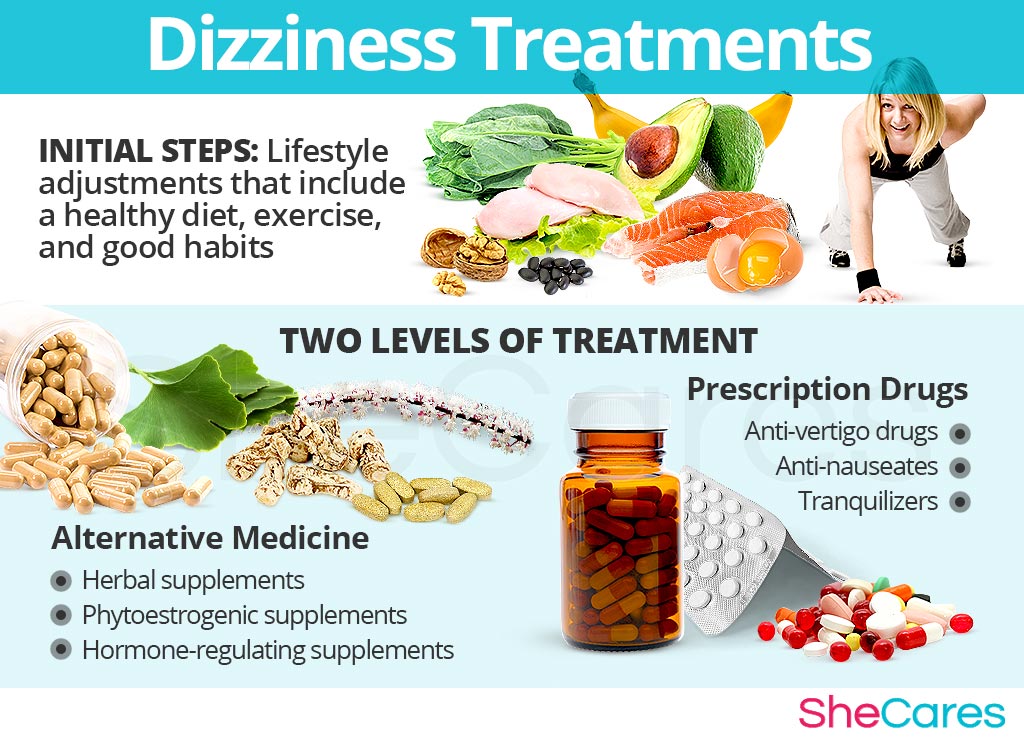
Sources
- MenopauseNow. (n.d.). Dizziness during Menopause. Retrieved August 25, 2017, from https://www.menopausenow.com/dizziness
- American Academy of Physical Medicine and Rehabilitation. (2016). Dizziness. Retrieved October 2, 2017, from https://now.aapmr.org/dizziness/
- Brain & Spine Foundation. (2015). Dizziness and balance problem. Retrieved October 2, 2017, from https://www.brainandspine.org.uk/dizziness-and-balance-problems
- BioPsychosocial Medicines. Dizziness in peri- and postmenopausal women is associated with anxiety: a cross-sectional study (2018)
- Menopause. Menopause and benign paroxysmal positional vertigo (2015)
- Gjerdingen, D.K. et al. (1993). Changes in women's physical health during the first postpartum year. Archives of Family Medicine, 2(3), 277-283. Retrieved October 2, 2017, from https://www.ncbi.nlm.nih.gov/pubmed/8252148
- Macedo Ferreira, L.M.D.B. et al. (2016). Risk Factors of Dizziness among Institutionalized Elderly Persons: A Case Control Study. Journal of Gerontology & Geriatric Research, 5(262). doi: 10.4172/2167-7182.1000262
- HealthLinkBC. (2016). Dizziness: Light-headedness and vertigo. Retrieved August 25, 2017, from https://www.healthlinkbc.ca/health-topics/dizzi
- Janssens, K.A.M. & Rosmalen, J.G.M. et al. (2011). Pubertal Status Predicts Back Pain, Overtiredness, and Dizziness in American and Dutch Adolescents. Pediatrics, 128(3), 553-559. doi: 10.1542/peds.2010-2364
- National Health Service UK. (2018). Dizziness (lightheadedness). Retrieved August 25, 2017, from http://www.nhs.uk/conditions/dizziness/pages/introduction.aspx
- Vestibular Disorders Association. (n.d.). Dietary Considerations. Retrieved October 2, 2017, from http://vestibular.org/understanding-vestibular-disorders/treatment/vestibular-diet#

